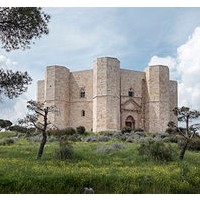
dal 1996 in continua innovazione tecnologica!
Sfrutta tecnologie avanzate per avere un sito web ottimizzato al 100%

Castel
del Monte in the municipality of Andria in the province of Bari is a
building of the thirteenth century, built by Emperor and King of the
Kingdom of Sicily, Frederick II in Apulia, in the same name of the
municipality of Andria, 18 km from the city, near the town of Santa Maria del Monte, in the province of Barletta-Andria-Trani.
It is situated on a hilltop plateau of the western Murge, 540 meters s.l.m.
It has been listed as national monuments Italians in 1936 and among the UNESCO World Heritage Site in 1996.
In 2014 was the thirtieth Italian state most visited site.
source wikipedia
The castle is built directly on bedrock, outcropping in many points, and is universally known for its octagonal shape. On each of the eight corners they are grafted eight towers of the same
shape in the curtain walls of local limestone, marked by a
string-course, open eight lancet windows on the lower floor, seven
mullioned windows and one mullioned window, facing Andria, in the upper
one.
The
courtyard, octagonal in shape, is characterized as the entire building,
from the color contrast of using coral breccia, limestone and marble; at one time there were also ancient sculptures, of which only the slab
depicting the procession of knights and a fragment of an
anthropomorphic figure.
At
the upper floor there are three doors, beneath which there are some
protruding elements and some holes, perhaps intended to hold a wooden
gallery useful in making independent of each other rooms, all
communicating with each other with a path annular, except for the first and eighth, separated by a wall in which
opens, at the top, a large oculus, probably used to communicate.
The sixteen rooms, eight for each plan, have a trapezoidal shape and were covered with an ingenious solution. The space is divided, in fact, in a square central bay covered cross
ribbed, (with semi in breach coral on the ground floor and marble
pillars to the upper trefoil), while the triangular space debris are
covered with barrel vaults ogival.
The time the cruise keys are different, decorated with anthropomorphic elements, zoomorphic and phytomorphic.
The
connection between the two floors is via three spiral staircases fill
in as many of these towers torri.Alcune welcome cisterns to collect
rainwater, in part also conveyed to the cistern dug into the rock, below
the central courtyard. In
other towers, however, are located bathrooms with toilet and sink, and
joined by everyone from a small room, probably used as a dressing room
or perhaps to house tanks for ablutions, for the care of the body was
very practiced by Frederick II and his court, according to a custom typical of the Arab world so loved by the king.
Great
interest is the sculptural set that although strongly depleted,
provides a significant testimony of the original decorative scheme, a
time characterized also wide range of colors of materials: mosaic tiles,
majolica tiles, glass paste and wall paintings, of which between the end of '700 and the first 800 writers and local historians saw the traces, describing them in their works.
Currently
there are still two anthropomorphic shelves in the Tower of the
falconer, telamons supporting the umbrella vault of one of the scalar
towers and a fragment of mosaic floor in the eighth room on the ground
floor. Provincial
Art Gallery in Bari have been temporarily deposited, however, two
important fragments of sculpture, depicting a head and a headless bust,
found during the extensive renovation, which no trace, however, of the
octagonal pool in the center of the courtyard have not returned, It cited by some scholars of the last century. (M.T.)
source site cultural heritage
